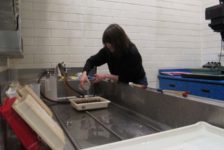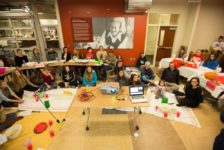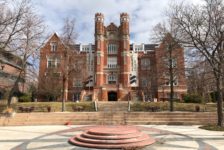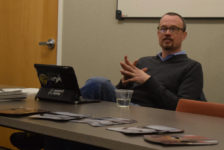
Morgan Shaver, junior math major, sits by Lake Lillian in the Wasatch Mountains last summer. Shaver hopes to explore the outdoors as mush as possible in her year off before medical school and said a gap year would be beneficial to her future. Photos courtesy Morgan Shaver
Taking a year or two off before “real life” starts—known as a gap year—is becoming the new norm, and students are figuring out all sorts of ways to spend this time finding themselves and their careers.
A gap year can consist of volunteer work, travel, internships etc., and it isn’t necessarily required to be a certain amount of time. A gap year can be any type of sabbatical that occurs after a major life event or, in this case, college graduation, according to the Salem Press Encyclopedia.
Whatever the chosen activity, people usually use this time period to figure out what they want to do for the rest of their lives.
“While gap years have been a part of the American undergraduate experience since at least the early 1980s, by the second decade of the 21st century, they were becoming a regular feature of students’ postgraduate careers, as an increasing number of recent graduates began taking time off for self-exploration prior to beginning graduate or professional school,” according to the Salem Press Encyclopedia.
“I’m pre-med and have been working my ass off the past few years. Before I go to med school, I would really like to do the classic VW-bus thing and road trip around the states or spend some time skiing the backcountry. Any kind of independent travel I think would be really beneficial to my future.” — Morgan Shaver, Westminster junior
For some, societal pressures to begin a chosen career field right after graduation are slowly fading away.
“I’m happy I took a gap year,” said Orie Katsilometes, graduate student. “I needed a little time to clear my head and remember what it’s like to be away from school.”
Katsilometes graduated in 2014 with a degree in environmental studies. He is currently a graduate student at Westminster’s Vieve Gore School of Business. During his gap year, he worked at REI, traveled, mountain biked and snowboarded.
“I learned that even though you may be more qualified than others, there is some age discrimination toward new grads in the job field,” Katsilometes said. “As far as myself, I learned that I didn’t truly understand just how hard it is to make a livable wage on your own.”
There are potential benefits to a gap year, but there is criticism that students from wealthier backgrounds can afford to take the time to experience new things and students from less affluent backgrounds cannot, according to the Salem Press Encyclopedia. This brings up the argument as to whether gap years should be sanctioned or, at most, mandatory.
“I wish gap years were more of a norm here in the states,” said Morgan Shaver, junior math major. “Most kids my age that I met while traveling Europe had taken a gap year of travel before college or even in the middle of their undergrad in order to figure out what they wanted to do. I think that would have been helpful.”
Though gap years may not be as much of a cultural norm in the U.S. as they are in Europe, statistics show that the number of students taking gap years in the U.S. is growing.

Morgan Shaver, junior math major, explores the Selkirk Mountains of British Columbia while ski touring on her spring semester off. Shaver hopes to spend a gap year skiing and exploring the backcountry and said that independent travel would be beneficial to her future.
“Gap year interest and enrollment trends continue to grow,” according to americangap.org. “We don’t know exactly how many U.S. students take a gap year each year, but amongst our sources, we are able to say that interest and enrollment is growing substantively.”
One reason for this may be that students are beginning to value self exploration and need a break from work before making a career decision.
“I’m pre-med and have been working my ass off the past few years,” Shaver said. “Before I go to med school, I would really like to do the classic VW-bus thing and road trip around the states or spend some time skiing the backcountry. Any kind of independent travel I think would be really beneficial to my future.”
College is usually a four-year track that allows students to find what they are interested in and become proficient enough in that subject area to enter that career field after graduation. The Westminster Career Resource Center (CRC) helps move along this process and is meant to decrease the stress some students may feel as graduation approaches.
“My team supports students in career development, so at any phase figuring out what they like to do all the way to a point where even they are alumni 20 years into their career and looking to make transitions,” said Brianna Koucos, CRC director. “We help them in every stage.”

Morgan Shaver, junior math major, ski tours the Selkirk Mountains in British Columbia on her spring semester off. Shaver hopes to spend a year skiing the backcountry before medical school.
Almost half of employed college grads are in jobs that don’t require a college degree. This may indicate that many students aren’t working in the career they planned on, according to Bureau of Labor statistics.
Koucos said that many students have this idea of what they want to do but haven’t thought of the details and requirements for the job that might conflict with their actual needs and wants.
“A lot of people say, ‘I absolutely don’t want to be in sales but I want to be in marketing,’” Koucos said. “It’s important to understand the connection between those two things.”
A gap year is one way to figure those problems out.
“I think what [gap years] really come down to is a sort of a plan,” Koucos said. “It’s important that the [gap year] is relaxing, beneficial and rejuvenating, but also that you don’t look back on it and say, ‘Man, I kind of wasted that time.’”
Whether it’s self-exploration or filling up space on a résumé, there are many gap year programs offered in the U.S. and abroad.
The market for post-graduate opportunities includes Americorps, Peacecorps, Outward Bound service trips and many more. All of these options can help make a gap year more accessible and affordable.
The CRC conducted a study on what Westminster students were doing after they graduated, and with a 59-percent knowledge rate, the responses were either that students were in full-time employment or in graduate school.
“I think grad school is kind of an extension of undergrad, just with higher expectations,” said Katsilometes, who is working on an M.B.A at Westminster’s graduate program. “Westminster makes it super personable.”
Whatever one chooses to do after graduation, the CRC employees suggest to have a plan and do a little research before jumping into anything.
“Remember why you went to school in the first place and value it,” Katsilometes said. “College may seem like the only future you can see right now, but there’s always something to learn.”









